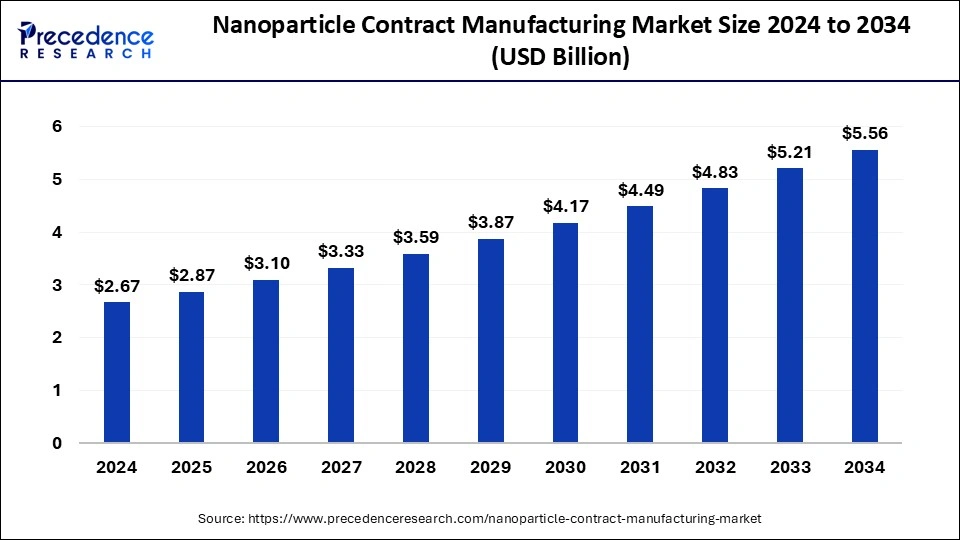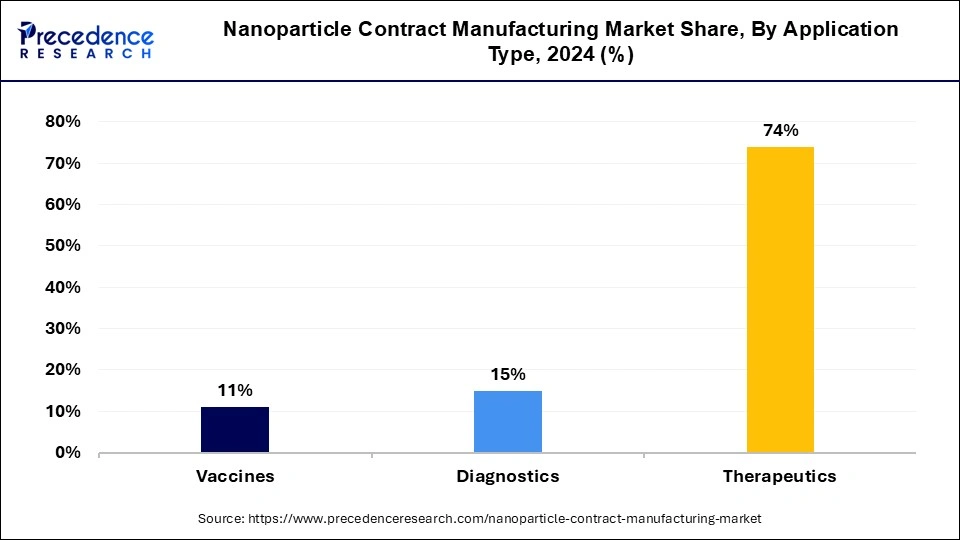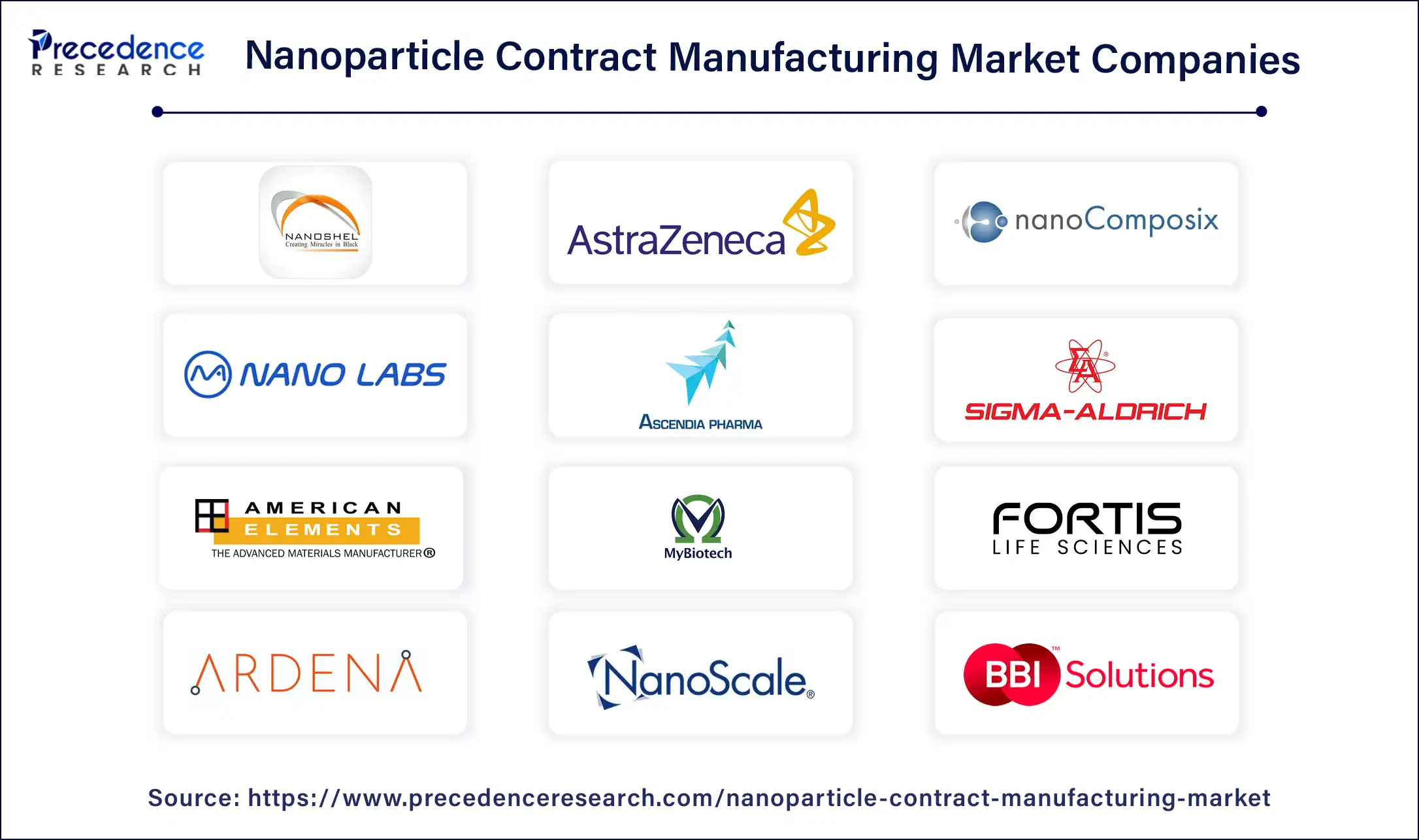Nanoparticle Contract Manufacturing Market Size and Growth 2025 to 2034
The global nanoparticle contract manufacturing market size was estimated at USD 2.67 billion in 2024 and is predicted to increase from USD 2.87 billion in 2025 to approximately USD 5.56 billion by 2034, expanding at a CAGR of 7.61% from 2025 to 2034. Nanoparticle contract manufacturing benefits include a strong focus on research & development, customized nanoparticle manufacturing capabilities, achieving greater operational flexibility, accessing larger capacities, and leveraging new technologies available with the service provider. These factors help the growth of the market.

Nanoparticle Contract Manufacturing Market Key Takeaways
- The global nanoparticle contract manufacturing market was valued at USD 2.67 billion in 2024.
- It is projected to reach USD 5.56 billion by 2034.
- The nanoparticle contract manufacturing market is expected to grow at a CAGR of 7.61% from 2025 to 2034.
- North America dominated the market with the biggest revenue share in 2024.
- Asia Pacific is estimated to be the fastest growing during the forecast period of 2025-2034.
- By nanoparticle type, the metal segment dominated the market in 2024.
- By nanoparticle type, the lipid segment is expected to be the fastest growing during the forecast period.
- By manufacturing scale type, the commercial segment dominated the market in 2024.
- By application type, the therapeutics segment dominated the nanoparticle contract manufacturing market in 2024.
- By application type, the diagnostics segment is the fastest growing during the forecast period.
Market Overview
The nanoparticle contract manufacturing market refers to the process of outsourcing the production of nanoparticles to specialized manufacturers. These manufacturers have the equipment, infrastructure, and expertise to fabricate and synthesize nanoparticles as per customers' requirements. The beneficial properties of nanoparticle manufacturing include bio-absorption, tumor targeting, bioavailability, bioactivity, effective drug delivery, antibacterial activity, and anti-inflammatory properties, which help the growth of the market. These nanoparticle properties help in biotechnological, pharmaceutical, and microbiological applications.
Nanoparticles are used as functional fillers, as carriers in drug delivery, as catalysts, etc. Forming multifunctional nanocomposites by combining nanoparticles with other materials. These materials are used in biomedical devices, water treatment, solar cells, and flexible electronics. These factors help to the growth of the market.
Nanoparticle Contract Manufacturing Market Growth Factors
- The nanoparticles contract manufacturing high demand due to nanoparticles' beneficial properties, including bio-absorption, tumor targeting, bioactivity, effective drug delivery, antibacterial activity, anti-inflammatory, biocompatibility, and nature.
- The nanoparticles are used as functional fillers like catalysts, used for imaging or sensing, and carriers for targeted drug delivery, which helps to grow the nanoparticle contract manufacturing market.
- Multifunctional nanocomposites are formed by combining nanoparticles with other materials, and these materials are used in biomedical devices, flexible electronics, and water treatment.
- By incorporating nanoparticles in the processes of manufacturing it helps to improve conductivity, strength, and other beneficial characteristics. These factors help to the growth of the market.
Market Scope
| Report Coverage | Details |
| Market Size by 2034 | USD 5.56 Billion |
| Market Size in 2025 | USD 2.87 Billion |
| Growth Rate from 2025 to 2034 | CAGR of 7.61% |
| Largest Market | North America |
| Base Year | 2024 |
| Forecast Period | 2025 to 2034 |
| Segments Covered | Nanoparticle Type, Manufacturing Scale, Application Type, and Regions |
| Regions Covered | North America, Europe, Asia-Pacific, Latin America, and Middle East & Africa |
Market Dynamics
Drivers
Rising applications of nanoparticles
The rising applications of nanoparticles in many industries, including cosmetics, energy, electronics, potent antimicrobial agents, agriculture, industry, business, public health, medicine, and healthcare, are helping the growth of the market. The nanoparticle's small size is especially beneficial in medicine; it is highly circulated throughout the body and enters cells or is designed to bind certain cells. These properties allowed new ways of improving images of tumors or organs and other diseased tissues in the body. In the healthcare sector, nanotechnology is used in nanomedicine, such as the diagnosis or therapy of different diseases by using nanoparticles. These applications help to grow the nanoparticle contract manufacturing market.
Increasing focus on nanotechnology research
Increasing investment in nanotechnology research by research organizations, governments, and academic institutions leads to increasing collaboration with manufacturers for nanoparticle fabrication and synthesis. Nanotechnology can enhance energy efficiency by developing new materials. These materials can store and capture energy more effectively. Nanotechnology can reduce environmental problems by developing new materials and devices that are capable of removing and detecting pollutants from the environment. It is used for making filters which can help to remove contaminants from air or water. These factors help to the growth of the nanoparticle contract manufacturing market.
Restraint
Disadvantages of nanoparticles
The disadvantages of nanoparticles include developing nanomaterials and devices that may be costly, cost, regulatory issues, long-term effects, and safety concerns that the nanoparticles may be harmful or toxic to the environment or human health. It can cause lung damage due to inhaled particulate matter deposited in the respiratory tract of the human and then the lung. The nanoparticles can lead to air pollution, which is very harmful to living organisms. These factors can restrict the growth of the nanoparticle contract manufacturing market.
Opportunity
Research & development
There is an opportunity for nanoparticle-based technologies to enhance the speed, efficiency, and sustainability of already existing processes. The advancement of advanced technologies in nanoparticle synthesis techniques allowed manufacturers to produce nanoparticles with specific shapes, surfaces, and size characteristics, helping to increase the scope of applications and contribute to the growth of the market. Developing new devices and materials based on the nanoparticles can reduce environmental problems. Developed materials help to detect and remove pollutants from the environment. Applying miniaturization in nanoparticle-based components and devices results in efficient, small, and lighter products. It helps to improve performance in industries including transportation and electronics. These factors help to the growth of the nanoparticle contract manufacturing market.
Nanoparticle Type Insights
The metal segment dominated the nanoparticle contract manufacturing market in 2024. Metal nanoparticles have a wide range of surface modification strategies, which makes them more stable and biocompatible and grants certain functions that are necessary for nanomedicine applications. The stability, size, structure, and physiochemical properties of the metal nanoparticles lead to the choice of a metallic nanoparticle preparation process. Due to these properties of metal nanoparticles, they are used in many industries like pharmaceutical, mechanical, medicine, optical, electronics, and energy.
Metal nanoparticles are increasingly used in biomedicine and other fields. Metal nanoparticles are used for drug delivery systems due to their benefits, such as the half-life of the drug carrier, increased stability in circulation, necessary biodistribution, and active or passive targeting of the required target site. In the drug delivery system, different metal nanoparticles like nanometal, metal sulfide, zinc oxide, copper, palladium, platinum, gold, silver, etc., are used. These factors help to the growth of the metal nanoparticle type segment and contribute to the growth of the market.
The lipid segment is expected to be the fastest-growing during the forecast period. Lipid nanoparticles have many benefits, including the ability to assimilate drugs into nanocarriers, the possibility to develop new therapeutics, and enhanced ocular residence time of drugs, skin penetrability, intestinal absorption, pharmacokinetic parameters, bioavailability, and solubility. The benefits of lipid nanoparticles also include tolerability for certain use cell types, environments, cases, or cargo types. It can transport diverse therapeutic substances. It has low cytotoxicity and immunogenicity, improved penetration into tissues to deliver therapeutics, and high nucleic acid encapsulation potency and efficiency.
These benefits of lipid nanoparticles help the growth of the segment. Lipid nanoparticles are used in mRNA vaccines due to therapeutic efficacy and higher bioavailability. The applications of lipid nanoparticles include research, drug delivery, clinical medicine, and others. These factors help the growth of the lipid nanoparticle type segment and contribute to the growth of the nanoparticle contract manufacturing market.
Manufacturing Scale Type
The commercial scale segment dominated the nanoparticle contract manufacturing market in 2024. Commercial-scale manufacturing of nanoparticles offers many benefits, especially in nanomedicine. The benefits include controlled and targeted drug delivery to specific cells or tissues to improve therapeutic outcomes by minimizing side effects. Nanoparticle-based medicine formulations may decrease toxicity from non-specific drug distribution, which makes them safer for patients. Commercial-scale manufacturing of nanoparticles helps to improve the bioavailability, solubility, and permeability of drugs by ensuring better efficacy. Nanoparticles act as imaging agents that help detect and monitor diseases. They also allow biosensing for early diagnosis.
To maintain therapeutic levels, nanoparticles may be engineered to release drugs slowly over time. Nanoparticle modification with capping agents can improve their targeting capabilities and prevent accumulation. In the pharmaceutical sector, there is a need for easy, fast, implementable, and adaptable to maintain production lines for the production of nanoparticles for commercial use and clinical trials. These factors help to grow the commercial-scale manufacturing-scale-type segment and contribute to the growth of the market.
Application Type Insights
The therapeutics segment dominated the nanoparticle contract manufacturing market in 2024. The nanoparticles are used in many applications, including agriculture and medicine. The therapeutic applications and benefits of nanoparticles include drug delivery, cancer treatment, tissue engineering, diagnostic imaging, antibacterial properties, gene therapy, and vaccine development. In medicines, nanoparticles are used for gene therapies, immunotherapies, tissue engineering, screening of many diseases, and drug delivery systems. These nanocarriers or nanostructures have unique characteristics and physiobiological properties that have provided many therapeutic techniques and methods against cancers and microbial infections and for tissue regeneration.

In cancer treatment, nanoparticles are highly used. Nanomedicine is rapidly growing to treat specific diseases like cardiovascular diseases, breast cancer, lung cancer, brain cancer, and many others. These nanoparticle-based medicines can help to reduce drug aggregation and release time, improve drug availability, and improve drug solubility in the blood. These factors help to the growth of the therapeutics application type segment and contribute to the growth of the market.
The diagnostics segment is the fastest-growing during the forecast period. Nanoparticles or nanotechnologies are applied to molecular diagnostics and also include cutting-edge molecular diagnostics methods like DNA and protein microarray biochips. Nanotechnologies allow diagnosis at the single molecule levels and single-cell levels. Nanoparticles are developed for early diagnostics and imaging. Using nanoparticles helps visualize pathologies and improves understanding of diseases and treatments. Bio-templated nanoparticles are used for high-resolution imaging, especially in early optical cancer treatment efficacy and cancer detection. Nanoparticles are also used to detect bioterrorism agents, tumors, neurological diseases, and infectious diseases. These factors help the growth of the diagnostics application type segment and contribute to the growth of the nanoparticle contract manufacturing market.
Regional Insights
North America dominated the nanoparticle contract manufacturing market in 2024. Advanced technologies, research & development activities, and well-developed pharmaceutical and healthcare sectors help to the growth of the market in the North American region. Most of the companies that offer lipid nanoparticle manufacturing have headquarters in North America. For instance, in July 2023, in Chicago, Illinois, United States, a new biotechnology company, Nanogenix, launched out of University Health Network's (UHN) new venture pipeline, which aims to start clinical trials for its new photo-immune therapy platform to change treatment possibilities for cancer patients. UHN is Canada's leading medical research commercialization leader and research hospital.
Asia Pacific is estimated to be the fastest-growing during the forecast period of 2024-2033. Increasing demand for nanoparticles in many industries, increasing investment in research& development, and increasing industrialization help to the growth of the nanoparticle contract manufacturing market. For instance, in August 2022, IIT Mandi researchers developed biodegradable nanoparticles to treat colorectal cancer. The researchers developed CSSA (stearic acid) nanoparticles as drug carriers. These new nanoparticles release the drug in response to stimuli that are certain cancer sites only.
Nanoparticle Contract Manufacturing Market Companies

- MCH Nano Solutions
- BBI Solutions (Novacyt Group)
- Nano Labs Corporation
- Nanoscale Corporation
- Nanoshel LLC
- Sigma-Aldrich Corporation (Merke KGaA)
- SkySpring Nanomaterials, Inc.
- Nanocomposix, Inc.
- American Elements
- MyBiotech
- Fortis Life Sciences
- AstraZeneca
- Ascendia Pharmaceuticals
- Ardena Holding NV.
- Evonik Industries AG
Recent Developments
- In February 2022, IIT Kanpur developed biodegradable nanoparticles to protect crops from diseases. This new biodegradable nanoparticle was developed to be used as an alternative to chemical pesticides, and it helps farmers protect crops from fungal and bacterial infections.
- In September 2023, the IISc scientists developed hybrid nanoparticles made of copper sulfide and gold to detect and kill cancer cells, especially those that form a solid tumor mass.
- In March 2024, to improve the systematic delivery of cancer immunotherapy effects against tumors, biocompatible nanoparticles were created by Purdue University researchers. These biocompatible PLGA or (Poly-lactic-co-glycolic acid) nanoparticles are modified with ATP to improve immunotherapy effects against malignant tumors.
Segments Covered in the Report
By Nanoparticle Type
- Metal Nanoparticles
- Lipid Nanoparticles
- Others
By Manufacturing Scale
- Commercial
- Clinical
- Pre-clinical
By Application Type
- Therapeutics
- Diagnostics
- Vaccines
By Geography
- North America
- Asia Pacific
- Europe
- Latin America
- Middle East & Africa
For inquiries regarding discounts, bulk purchases, or customization requests, please contact us at sales@precedenceresearch.com
Frequently Asked Questions
Ask For Sample
No cookie-cutter, only authentic analysis – take the 1st step to become a Precedence Research client
 sales@precedenceresearch.com
sales@precedenceresearch.com
 +1 804-441-9344
+1 804-441-9344